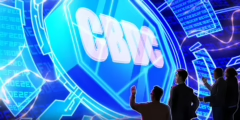The hookup between Celo and Circle will benefit both sides as Celo continues to advance real-world use cases and Circle expands its reach.
Circle’s USD Coin
USDC
tickers down
$1.00
will launch natively on the Celo blockchain, the Celo Foundation has announced.
Minting USDC on the blockchain will boost Celo’s use cases for real-world assets and enhance USDC’s convertibility into fiat currencies.
USDC will join Celo’s native proof-of-stake governance token, CELO
CELO
$0.74
, as the blockchain transitions from an Ethereum Virtual Machine-compatible layer-1 chain to an Ethereum layer-2 protocol. The Celo community will vote in an upcoming proposal on making USDC the gas currency for the ecosystem.
Mento Lab already issues the cUSD stablecoin on Celo, as well as other stablecoins such as the cEuro, cREAL (pegged to the Brazilian real) and eXOF (pegged to the West African CFA franc).
Celo positions itself as part of the regenerative finance movement and is carbon-neutral and mobile-first. It emphasizes mobile technology to improve the user experience in emerging economies.
إقرأ أيضا:Apple Intelligence rival secures $10M to develop open-source alternativeThe Opera web platform launched its MiniPay wallet on Celo in September for African users
with mobile phones. Circle senior business development manager Shamus Noonan said in a statement:
“This partnership will help broaden access for USDC and leverage Celo’s mobile-first user-base in regions where blockchain adoption is highest.”
The integration of USDC will also give institutional and enterprise users access to the Circle Mint on/off-ramp, which will enable greater activity on Celo, the Celo Foundation said.
USDC is the second-largest stablecoin with a market cap of $26.5 billion, following Tether
USDT
tickers down
$1.00
, with a market cap of $96.1 billion. It reportedly filed for an initial public offering in the United States in mid-January.
Circle has been expanding its global reach. It was granted conditional registration as a virtual assets service provider in France in December. A month earlier,
it partnered with Japanese financial services firm SBI to introduce USDC in that country. It has partnered with global payments processor Visa since 2020 and expanded cooperation using USDC issued on Ethereum and Solana in September.
Circle has also come under fire for alleged connections to money laundering — allegations it has denied.







